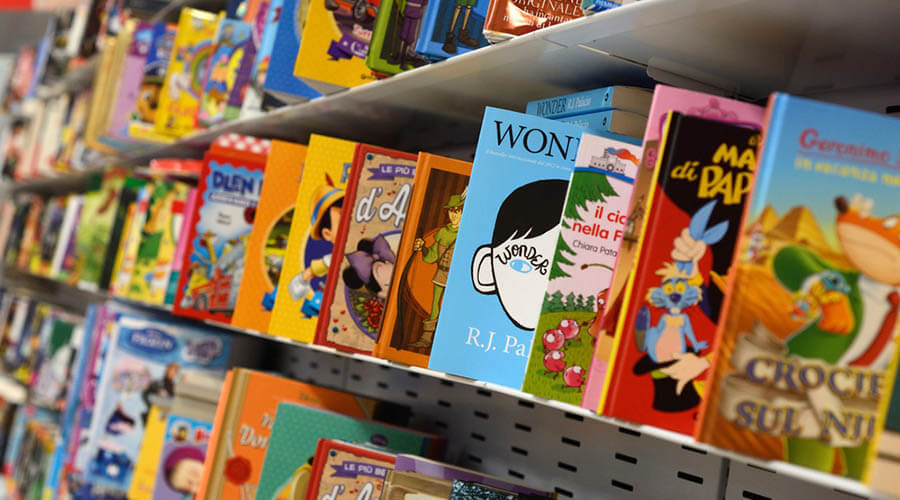In this edition of The Interview, Fair Observer talks to Andy Seed, a British children’s author.
Why is reading so important? It’s a question that academics, governments and families have considered essential for children. Indeed, reading helps to broaden the mind. Those who read books experience stronger family relationships, improved communication and better critical thinking skills.
Reading books is highly important for a child’s development. That is why there is so much investment on children’s literature and media. Aside from the psychological benefits for young people, reading helps to expose children to creative wisdom and assists in shaping their personality.
Children’s reading skills are pivotal to their success in school since the act helps improve their communication and language development. Moreover, there are studies supporting the conviction that extra-curricular reading and reading for pleasure make a big difference in schoolchildren’s educational performance by developing their vocabulary, increasing their general knowledge and giving them a better understanding of other cultures.
It might be surprising, but reading books — even to toddlers — can positively impact their social and learning skills. A 2017 study by the American Academy of Pediatrics found that “reading books with a child beginning in early infancy can boost vocabulary and reading skills four years later, before the start of elementary school.”
On the other hand, children whose parents do not read to them are less creative than their peers. A study by Ohio State University suggests that “children whose parents read them five age-appropriate books a day (containing between 140 and 228 words, on average) enter kindergarten with a vocabulary potentially richer for 1.4 million words. This is while children “who are never read to hear only 4,662 words before the age of 5.”
In this edition of The Interview, Fair Observer talks to Andy Seed, a British children’s author, about the importance of reading in schools and families.
The transcript has been edited for clarity.
Kourosh Ziabari: A survey by Entertainment Retailers Association found in 2018 that families in the UK spent more on home entertainment products such as music, video and games than magazines, books and newspapers. Do you find this finding worrying? Does it point to a long-term trend that should be treated seriously?
Andy Seed: I certainly don’t find it surprising. Magazines, newspapers, comics and related print publications have been dying a slow death as digital provision of similar kinds of content has proliferated and devices have improved the ways in which they present it.
The situation with books is a concern because reading a book, particularly a traditional novel, is generally a different kind of cognitive experience. Reading a book is not only a commitment because of the sheer amount of text, but it involves high levels of concentration, neural activity, understanding and immersion in written language. All of these are rich experiences in terms of not only learning, but the development of empathy, contemplation, imagination and coming to terms with the way the world works.
Entertainment products such as video — by their nature — are fleeting and allow very little time to ponder, ask questions, think through what is going on and more. I think this has, in part, led to the trend of superficiality in contemporary life where many people have little grasp of and minimal interest in important dynamics affecting us all such as political events, environmental threats, changes to diet, migration and the effect that technology is having on our lives. Yes, in my view, it certainly points to an ongoing problematic trend that sadly leaders are doing almost nothing to challenge.
Ziabari: What do you think schools can do to promote and encourage reading and make children more interested in exploring literature?
Seed: This is a major challenge, partly because of the trends outlined in the previous question. Young people today have a plethora of choice: TV, computer, tablet, smartphone and gaming consoles for a start. Then there are far more organized activities available than they were in days past: sports, martial arts classes, drama, musical tuition, dance, gym and many others. Many kids also have excessive homework and they are tired after school — where teachers are under pressure to get them through tests and exams.
So, schools have to first of all themselves recognize the value of reading for pleasure. Sadly, many teachers don’t have time because they are weighed down by excessive curriculum expectations brought in by politicians wanting to be seen to be driving up standards.
However, there is considerable research evidence that shows that reading for pleasure is an incredibly powerful way for young people to learn, make improvement, find success, develop skills and empathy and understanding. Where schools do recognize this, the first thing they need to do is to fully embrace it as a whole, led by the principal. If all school employees are on board, then change can happen. Teachers and other staff need to read children’s books themselves so they are armed with knowledge and understanding of what is out there, and so they can transmit enthusiasm — something which is vital when promoting reading — and make appropriate recommendations to students.
Secondly, they need to communicate the importance of reading for pleasure both to parents and to students. Young people need to understand that becoming a keen reader can change their lives for the better, help them do well and open up opportunities in life. They need to know simple, hard facts such as that readers earn more money as adults.
Thirdly, schools need to invest in books. Reading is about choice — finding the right book — and that is more likely to happen where there is a wide range of good books available and frequently added to.
Fourthly, schools can help families connect with their local public library. They need to encourage membership and shout out constantly that libraries are a source of free books. Almost nothing in life is free, except the very things that can help you the most: books.
There are many other things that schools can do, such as ensuring teachers read to their class every day, but those are the fundamentals, the foundations upon which success can be built. There is one more thing that can get a kid reading and that is meeting an author, so I would also recommend that schools invest in bringing in an inspirational author a few times a year.
Ziabari: What happens when parents are busy, tired or indifferent to read to their children? In what ways will children suffer as a result of the parents’ inability or reluctance to spend time reading to them?
Seed: At a most basic level, the child misses out. They miss out on the magic of stories, the adventure, the opportunity to visit another world and meet amazing characters. They miss out on developing an understanding of life and the consequences of actions. They miss out on fun, wordplay, silliness, joy, jokes, good times. And there is much more. A parent reading to a child is a time of bonding and relationship-building. It’s like saying: I value our time together and I’m going to treat you to something good. It’s helping a son or daughter to grow their imagination, to have creative thoughts as they think about the story, or simply to learn and ask questions, as they share a factual book.
I read a wonderful quote recently: “Books help children to make sense of the world in troubled times.” How true, and how much better that this happens with mom or dad there for reassurance. Having said all that, I have no desire to dish out the guilt. I am a parent and when my kids were young there were times when I was just too knackered, to use an excellent British term.
Ziabari: How is the literary taste of children shaped? Do schools and parents play a role in developing a child’s interest in particular books or certain authors? Is what they read important?
Seed: That’s a very interesting question. Most certainly, parents and teachers play a role in shaping reading, especially in the early stages, but ultimately the child’s own personality will take over and they will seek out reading material that satisfies their interests. This is why choice is so important, and why taking a kid to the library regularly is a great thing — because the choice is so broad.
I do think it’s very helpful if parents and teachers read a wide range of books and authors to their children, including some lightweight stuff that is just fun. Some people think it’s essential to always present “quality” writing to young people, but reading Shakespeare to a 5-year-old is a surefire way to put them off reading, possibly for life. Remember, books have to compete with screens and video games and interactive noisy fun-packed devices, so parents and schools should show kids that books can be fun too, as well as challenging and moving and deep.
So, the menu should include graphic novels, diary-based stories, comic books, factual books, TV and film tie-ins, humorous poetry, puzzle books, quiz books and more. Hopefully, as children grow up they will move onto reading some of the “best” books, as these are introduced or suggested or given as gifts. There is some dross out there too, so adults should be careful and have a good look at what is being read.
Ziabari: How important is it for children’s authors to stay in touch with children through school visits and having real-life conversations with them? Does it inspire children to become future writers if they can get in touch with the authors of the books they read?
Seed: Personally, I like to stay in touch with children. I visit schools all the time and I talk to thousands of children through each year. Every conversation or question or comment in those settings gives me some insight into the mind of a child, and also may well tell me something about their life. But I don’t think it’s essential for every author to do this. Some of the greatest writers for children were fairly reclusive people who simply possessed magnificent imaginations paired with a writing style that worked.
Reading for pleasure is just that — it’s reading whatever you enjoy because, well, you enjoy it. You’ll learn along the way too, of course … but reading for learning is goal-oriented, it’s work.
I think it’s probably more helpful to writers of factual books to know children very well, in many ways, because they have to explain and present reality in a way that young minds can take on board effectively. That’s probably less easy than many people think. Another factor is humor: I do think it helps to know what makes kids laugh. But again, some authors just have that gift — they simply know which buttons to press.
To answer the second part of the question: Yes, without doubt it inspires children to become future writers if they meet or have some kind of communication with a real-life author, especially one whose books they have been introduced to. I find this all the time, and on my school visits I present the role of writer as an aspirational one: I tell the audience all the best bits about my job, including travel, fan mail, creativity, awards, invitations to festivals and more, and finally being the boss — with its associated access to the cookie jar. But, for me, the key part of meeting children is showing them that books can be enjoyable. I want to challenge negative attitudes to reading and I want to express how much becoming a reader can give them advantages in life.
Ziabari: What can parents and schools do to stir interest in children who are unenthusiastic about reading?
Seed: One of the best approaches in this situation is to find a good nonfiction book about something that the child is really interested in. This could be the game they are always playing or a sport or indeed anything. The key is to make sure that it’s as up to date as possible and attractive, as well as being suited to the child’s age and reading ability. This can be done as a gift or the local library can be used, or check the online library catalogue to find out what books are available.
The key word in reading for pleasure is “pleasure.” No one can force a child to enjoy something and, therefore, it’s important to keep an open mind and accept that the book or books offered might be rejected. As usual, it will help if the child can choose. The child may only look at the book briefly before returning to his/her favorite device, but you may least have moved some way in challenging a negative attitude toward books. If there’s a well-illustrated book about a kid’s favorite person, game, place or team, then it shows them that not all books are boring. This approach can work with fiction too, but for many reluctant readers a long novel appears as a sea of text. A great cover design can help with this.
Another approach is to limit screen time and talk about why this is a good idea. Don’t throw a book into the space created, but rather fix up some fun family activities and introduce the library or a chance to choose or buy a book later. A quiet environment free from distraction aids reading too. For this reason, I do not advocate young people reading e-books on smartphones — one notification can undo everything.
The foundations for avoiding the situation outlined in your question are laid down in early childhood. However, if a child grows up with books around him or her and is read to regularly and taken to the library and allowed to choose and develop interests when reading, and if the parents model reading books themselves, then reading is normalized and it’s much more likely to stick. A mom and dad who stare at smartphones or iPads all day cannot expect their kids to behave differently. As with all of the world’s problems, prevention is better than cure.
Ziabari: You are a children’s author and have written over 30 books for children. What are the delicacies of writing for children? What skills does writing for children require?
Seed: That’s another big question! One of the delicacies today is, of course, the whole question of political correctness and using inclusive language and featuring culturally diverse characters and scenarios. It cannot be ignored because publishers demand that books have maximum appeal, and they also want their titles to be seen as relevant to the multicultural world that we inhabit. There needs to be gender balance and a recognition that some readers, such as disabled children, so very rarely see themselves represented on the printed page.
To be really successful, books also need to have an international appeal. So, your puns in your new book may be witty and hilarious, but will they work in Swedish or Japanese? Humor isn’t the only thing that doesn’t translate easily. Recently, I wrote a book about wildlife tracks and signs. I wanted to feature an animal beloved in the UK, the hedgehog, only to be told by an editor that they don’t exist in North America, a key market for the book —I had to find another example.
Writing for children also involves pitching language at the right level, of course. I recently read a novel aimed at ages 9 to 11. The subject was appealing, the characters perfect, but the vocabulary and sophistication of the writers’ style were just too far beyond the great majority of kids that age. Parents sometimes say to me that the age bracket question doesn’t matter because their little Johnny “is so just smart and such a brilliant reader” that he can manage books aimed at much older children. But the chances are that Johnny doesn’t have the emotional maturity to understand the themes or the underlying complexities of the characters if it’s fiction.
 Yet authors like me want every book we write to have maximum appeal to the widest possible audience, and so we must constantly walk a tightrope, balancing language level and depth of subject matter and humor and realism. The illustrations come into play here too, not least as most books still are, sadly, judged by their cover.
Yet authors like me want every book we write to have maximum appeal to the widest possible audience, and so we must constantly walk a tightrope, balancing language level and depth of subject matter and humor and realism. The illustrations come into play here too, not least as most books still are, sadly, judged by their cover.
The skill of the writer is firstly to capture the child’s imagination, hook them in with great lures, whether action or mystery or characters or theme or facts or laughs. Then the quality has to be maintained, surprises have to be supplied, the story needs to envelop the reader, whether in fact or fiction, so that he or she is there and tasting, touching, smelling or feeling their heart race as they escape the near catastrophe. And then lots of children just like gross smells, pranks, wackiness and sassy protagonists. Older kids will want gripping adventure and challenge.
There are so many factors at play here. But there is no recipe, no formula. And publishers get it wrong too. J.K. Rowling had the first Harry Potter book rejected 12 times. Now and again, someone brings something new and different.
Ziabari: How is reading for pleasure different from reading for learning? Are you in favor of encouraging encyclopedic explorations for children, or do you think they should only read to have fun?
Seed: Reading for pleasure is just that — it’s reading whatever you enjoy because, well, you enjoy it. You’ll learn along the way too, of course — it’s impossible not to — but reading for learning is goal-oriented, it’s work. When you read something to learn, you hopefully reach a point where you find what you’re looking for, or your knowledge is sufficient and then you stop. Reading for pleasure is continuous and not limited by having an end in this way.
Many children, often boys, do find simple pleasure in absorbing facts. Just look how many kids have a terrifying encyclopedic knowledge of dinosaurs! I used to love books of lists, and still do, and there is that glorious serendipitous pleasure in finding a peculiar random fact that simply tickles you. So, yes, I am all for children reading for learning and having fun, but I don’t see that the two should be exclusive. If you’re reading to learn and it’s dull going, get a better book.
Ziabari: What are the features of a solid reading culture that parents should subscribe to? What are some of your recommendations for parents to develop a reliable book-reading relationship with their children?
Seed: I mentioned many of these earlier. Foremost, reading parents have reading children. Reading families live in homes where there are books in evidence, shelved around the house and frequently perused, shared, enjoyed, lent, borrowed, talked about and celebrated. New books are always there at Christmas and birthdays. There are trips to the local bookstore where the child can have time to browse and choose. There are regular visits to the local public library and membership is used fully, for example, by reserving books online or using the catalogue. Dads join in these things too. Male role models are too often lacking and yet they are significant and powerful. Children are read to every night. Those are the foundations.
Beyond that, book groups are joined and literary festivals that include author events for kids are attended. You queue up for a signed book and meet the author, and ask a question. You follow book bloggers and tweeters who make reliable recommendations.
In terms of fostering a book relationship with children (not a term I’ve come across before but I like it): As with any good relationship it’s based on communication, encouragement and love. So, talk about books and be open to hearing that a book you adore just wasn’t enjoyed. C’est la vie. Let your children gabble through the mystifying plot of their latest read, telling you every tiny twist and turn, however tedious, even when you are busy.
Encourage by telling them how proud you are that they read and how good they are at reading. Encourage them by investing: go to the bookstore, hand over the money and let them choose. A kids’ novel can cost the same as 3 cups of coffee. Which is better value? Encourage them to try new authors, new series, new genres. This is where the library is a marvel. You can borrow 10 books and reject eight and nobody minds. Get 10 more and keep getting them until your child discovers a gem.
But let the kid choose. Hold back and try not to take control of what they read. Yes, some of it will be unsuitable. But deal with that in a sensitive way. Good books will win out because they offer the most rewarding reading experience. And be aware that the classics you enjoyed as a kid may not cut the mustard with today’s generation.
The views expressed in this article are the author’s own and do not necessarily reflect Fair Observer’s editorial policy.
Support Fair Observer
We rely on your support for our independence, diversity and quality.
For more than 10 years, Fair Observer has been free, fair and independent. No billionaire owns us, no advertisers control us. We are a reader-supported nonprofit. Unlike many other publications, we keep our content free for readers regardless of where they live or whether they can afford to pay. We have no paywalls and no ads.
In the post-truth era of fake news, echo chambers and filter bubbles, we publish a plurality of perspectives from around the world. Anyone can publish with us, but everyone goes through a rigorous editorial process. So, you get fact-checked, well-reasoned content instead of noise.
We publish 2,500+ voices from 90+ countries. We also conduct education and training programs
on subjects ranging from digital media and journalism to writing and critical thinking. This
doesn’t come cheap. Servers, editors, trainers and web developers cost
money.
Please consider supporting us on a regular basis as a recurring donor or a
sustaining member.
Will you support FO’s journalism?
We rely on your support for our independence, diversity and quality.







